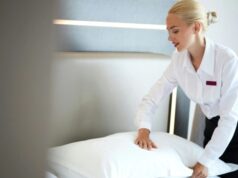
Managing maintenance in hotels and resorts with hundreds of rooms, multiple floors, and numerous assets is no small feat. Facility managers must possess strong organizational skills and an efficient maintenance management strategy to ensure a comfortable stay for their guests, which can lead to continued business and growth.
Maintaining assets is crucial for guest satisfaction, as it reduces the likelihood of inconvenience and ensures a positive experience during their stay. To enhance productivity among staff and effectively track maintenance needs across all areas of a hotel or resort, maintenance managers should consider practicing preventive maintenance (PM) by utilizing a computerized maintenance management system (CMMS).
A CMMS is a specialized maintenance management software that provides real-time updates on equipment and facilities, improving accuracy and organization. By implementing a CMMS, hotels, and resorts can improve service quality and enhance guest satisfaction. Read on to discover three effective ways for hotel and resort managers to optimize their maintenance management using a CMMS.
1. Cut Down on Maintenance Costs & Needs
In the hospitality industry, customer satisfaction is a top priority for hotels and resorts. However, if equipment within rooms, hallways, or common areas experiences downtime, guest satisfaction can take a significant hit.
To avoid this, maintenance managers can proactively plan for replacements or upgrades by utilizing a CMMS. With a CMMS, organizations can keep track of the condition of current equipment, the date of the last maintenance or replacement, and the availability of replacement parts. This approach not only helps keep facilities organized, but it also assists in budgeting and avoiding inventory stockouts.
Hotels must be aware of the various spaces on their properties that are susceptible to asset downtime, including guestrooms with kitchenettes, bathrooms, and laundry facilities; public resort areas, such as pools, locker rooms, gyms, and restaurants; and behind-the-scenes equipment, including mechanical and electrical systems for the entire property. By implementing a CMMS, hotels, and resorts can save both themselves and their guests money in the long run.
By tracking maintenance needs and equipment repairs, hotels can give more accurate cost estimates, and a CMMS helps lengthen the asset life, enabling hotels and resorts to offer more competitive rates and save their guests money.
2. PPE Tracking & Housekeeping
Ensuring the health and safety of both staff and guests has always been a top priority for hotel managers. However, in recent times, this priority has grown considerably due to new social distancing and sanitation requirements. As a result, hotel managers must track the number of safety supplies, and other essential items like hand sanitisers, face masks, and more.
Additionally, hotel rooms now require not only proper cleaning but also more time between the previous guest checking out and the new guest checking in. Fortunately, modern CMMS solutions offer features to help solve these challenges. Hotel managers may organize cleaning chores in advance, attach thorough questionnaires to each room, and easily retrieve relevant data with a specific PPE tracking function and housekeeping module.
By utilizing a CMMS solution, hotel managers can prioritize the health and safety of their staff and guests while maintaining high levels of efficiency and organization.
3. Asset Tracking
Efficient and effective management of hotel processes is a challenging task for managers unless they know the location of important assets and equipment within the hotel. Additionally, they should also be aware of backups or replacements in case of unforeseen circumstances. Luckily, with a CMMS, the maintenance team can collect and record important data about all hotel facilities, including computers, TVs, kitchenware, and toiletries.
This software also helps workers create comprehensive reports and keep track of information regarding acquisition, compliance and safety requirements, transfer, and preventative maintenance. By keeping track of assets, maintenance becomes more efficient and more accessible.
4. Decreased Equipment Downtime & Preventive Maintenance
With the help of CMMS software, hotel managers can establish efficient preventive maintenance strategies that ensure all essential tasks are completed according to manufacturer and industry standards.
The software also notifies technicians in the event of a malfunction or when an asset requires maintenance, resulting in swift responses and reduced response times. This streamlined approach minimizes downtime and maximizes productivity, resulting in a more pleasant experience for hotel guests.
5. Better Response Time
Mechanical, electrical, and plumbing system malfunctions are among the most common maintenance tasks that hotel staff encounter. These malfunctions can be particularly stressful since they can impact several customers on one level, or even the entire hotel.
However, the implementation of CMMS software can significantly reduce this stress by sending notifications directly to the appropriate maintenance personnel on their mobile devices. This feature allows for faster response times, improving customer experience and satisfaction. With reliable CMMS software in place, hotel staff can feel more confident in their ability to quickly address any issues that may arise and maintain a high level of customer service.
Final Thoughts
A robust CMMS software is crucial for boosting customer satisfaction, minimizing maintenance expenses, and optimizing the overall effectiveness of a hospitality enterprise. With the aid of an efficient and effective CMMS tool, hotel managers can streamline various maintenance management activities in their establishment, allowing them to effortlessly monitor workflows and track task completion. Furthermore, most platforms can accommodate hotel chains with several locations, and their user-friendly interface requires no downloads or logins.
About the Author
Lindsey Walker is the Marketing Manager for NEXGEN, a Sacramento, Calif.-based industry leader in designing advanced CMM systems and asset management software tools for utilities, facilities, public works, manufacturing, and fleet industries.






